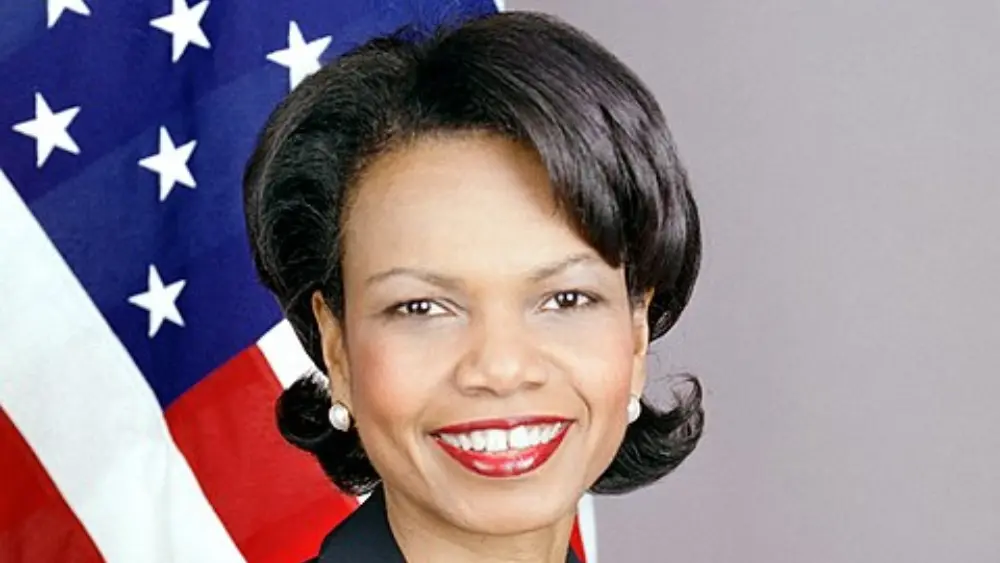Secretary Condoleezza Rice, an influential figure in American politics and global affairs, is celebrated for her trailblazing career in diplomacy. Born on November 14, 1954, in Birmingham, Alabama, Secretary Rice’s life is marked by her commitment to education, achievements in academia, and service to the nation.
Early Life and Education
Condoleezza Rice’s early life was deeply shaped by the civil rights movement and racial segregation in the American South. In Birmingham, Alabama, she witnessed segregation’s injustices, fueling her commitment to racial equality and justice. Rice’s educator parents played a crucial role, nurturing her love for learning and a strong belief in education’s transformative power. Recognizing its significance, they encouraged her excellence, laying the foundation for her remarkable educational journey.
Despite racial challenges, Rice’s determination and intellect enabled her to rise above adversity during that time. Early experiences, civil rights struggle, and an emphasis on education laid her foundation for prominence in American politics and diplomacy. Throughout her life, Condoleezza Rice drew on early values, becoming a passionate advocate for education, diversity, and equal opportunity for all.
Dr. Condoleezza Rice: Academic Excellence
Condoleezza Rice’s commitment to academic excellence was evident from an early age and continued to define her educational journey. After secondary school, she excelled at the University of Denver, completing her political science bachelor’s degree in just three years. Her dedication and intellect shone in academia, paving the way for extraordinary accomplishments.
Dr. Rice’s thirst for knowledge led her to earn a Ph.D. in political science from Stanford University, showcasing her curiosity. This testified to her scholarly prowess, marking the start of her academic career. Her education laid the foundation for her influential role in American politics and diplomacy. Dr. Rice’s intellectual rigor and unwavering commitment to learning shaped her identity in high government and diplomacy circles.
Academic Career
Dr. Condoleezza Rice’s academic career reflected her passion for education and international relations, defining her profound engagement in both fields. Following the completion of her Ph.D. at Stanford University, she returned to the institution as a faculty member. Rice’s foreign policy expertise and dedication to education shone as she guided students exploring global politics.
Beyond teaching, Rice took on key administrative roles. As Stanford University’s Provost, she led academic affairs and molded the university’s direction, wielding significant influence and responsibility. Her dedication to international relations and education made her a renowned scholar and educator, leaving a lasting impact on all.
Condoleezza Rice: U.S. National Security Advisor
In 2001, Dr. Condoleezza Rice became U.S. National Security Advisor to President George W. Bush, marking a momentous career milestone, as she became the President’s chief advisor on national security and foreign policy. Her influential tenure overlapped with global turmoil, including the 9/11 aftermath and the War on Terror, shaping her legacy. As U.S. National Security Advisor, she played a central role in coordinating various government agencies and providing counsel on critical national security decisions.
Condoleezza Rice’s time as U.S. National Security Advisor showcased her depth of expertise in global diplomacy and her ability to navigate complex geopolitical issues. Her leadership and diplomacy contributed to the formulation of key policies and strategies during a pivotal period in U.S. history. As a trusted advisor to the President, her influence shaped U.S. foreign policy and national security priorities, leaving a lasting impact.
Post-9/11 Era and the War on Terror
Condoleezza Rice’s tenure as U.S. National Security Advisor, which began in January 2001, took a momentous turn with the devastating terrorist attacks of September 11, 2001. In the aftermath of these attacks, Rice found herself at the forefront of the U.S. government’s response to the most significant act of terrorism on American soil. She played a critical role in advising President George W. Bush on the nation’s response, coordinating intelligence, security, and diplomatic efforts to prevent future attacks and bring those responsible to justice. Her leadership was instrumental in shaping the United States’ counterterrorism strategy during the early stages of the War on Terror.
Rice’s influence extended to advocating for the invasions of Afghanistan and Iraq as part of the broader War on Terror. These military campaigns were met with substantial debate and controversy, both domestically and internationally, and the decisions to engage in these conflicts had far-reaching consequences. Her role during this turbulent period remains a subject of study and discussion, as her counsel and the policies she helped formulate were central to the U.S. response to the new challenges posed by global terrorism.
Condoleezza Rice: U.S. Secretary of State
Dr. Condoleezza Rice’s career reached another historic milestone in 2005 when she became the 66th U.S. Secretary of State, making her the first African American woman to hold this esteemed position. As U.S. Secretary of State, Rice became the chief diplomat of the United States, leading the country’s foreign policy initiatives and representing the nation on the global stage. Her appointment reflected her extensive experience in international relations, deep knowledge of diplomatic affairs, and unwavering commitment to advancing American interests and values worldwide.
Dr. Rice’s tenure as U.S. Secretary of State was marked by extensive travel and diplomatic engagement across the globe. She worked tirelessly to address a wide range of international issues, from conflicts in the Middle East to nuclear non-proliferation agreements. Secretary Rice’s efforts to foster diplomatic solutions, promote democracy, and strengthen American alliances were central to her role. As the first African American woman to hold this position, she not only demonstrated her diplomatic acumen but also served as an inspiration to many, breaking barriers and paving the way for greater diversity in the highest levels of U.S. government and foreign policy.
Advocacy for Democracy and Human Rights
During her tenure as U.S. Secretary of State, Condoleezza Rice was a staunch advocate for democracy and human rights, both cornerstones of U.S. foreign policy. She recognized the fundamental importance of democratic governance in fostering stability, peace, and prosperity around the world. Rice’s diplomatic efforts were often centered on advancing democratic principles and practices, supporting nations in their transitions toward more open and representative systems of government.
Secretary Rice’s commitment to democracy and human rights extended to addressing a broad array of global challenges. She sought to promote the rule of law, protect individual freedoms, and combat corruption and authoritarianism. Her advocacy for democracy and human rights not only reflected her deeply held values but also underscored the belief that the spread of these principles is integral to achieving a more just, secure, and prosperous world. Throughout her career, Rice’s tireless efforts in upholding these ideals significantly influenced American foreign policy and reaffirmed the nation’s commitment to advancing the cause of democracy and human rights on the global stage.
Condoleezza Rice: Post-Government Career
Following her service in U.S. government, Condoleezza Rice embarked on a multifaceted and impactful post-government career. Drawing upon her extensive knowledge and experience in global diplomacy, she returned to academia, where she had a successful career as a professor, lecturer, and scholar. Her engagement with students and her continued contributions to academic discourse underscored her dedication to education and her belief in the importance of fostering the next generation of leaders.
Dr. Rice also turned her attention to authorship, penning books that offered insights into her experiences and perspectives on foreign policy, democracy, and leadership. Her writings provided valuable contributions to public discourse and offered readers a deeper understanding of the complexities of the international arena. Throughout her post-government career, Dr. Rice actively maintained an unwavering commitment to the principles of democracy, diplomacy, and education, ensuring that her wisdom and expertise continued to resonate in both academic and public spheres, where her influence persisted.

Legacy and Impact
Dr. Condoleezza Rice shaped U.S. foreign policy amidst global challenges, leaving a legacy defined by groundbreaking diplomatic achievements. Her historic role as the first African American woman Secretary of State marked a milestone in diversity and government inclusion. Throughout her career, she advocated for democracy, human rights, and global stability, leaving a lasting impact on the world.
Rice’s influence transcended her government service. She engaged in discourse and education and shared insights and experiences with future leaders. She was unwavering in her commitment to democratic values and the promotion of international cooperation. Her dedication to addressing global challenges left a lasting impact on American foreign policy. Condoleezza Rice’s legacy underscores leadership, education, and diplomacy in addressing global challenges and advancing freedom, democracy, and human rights.











